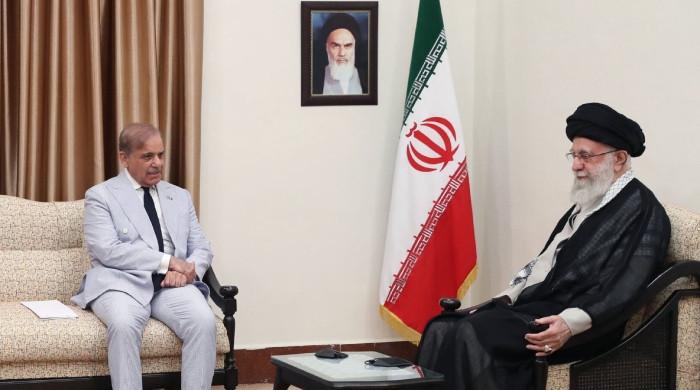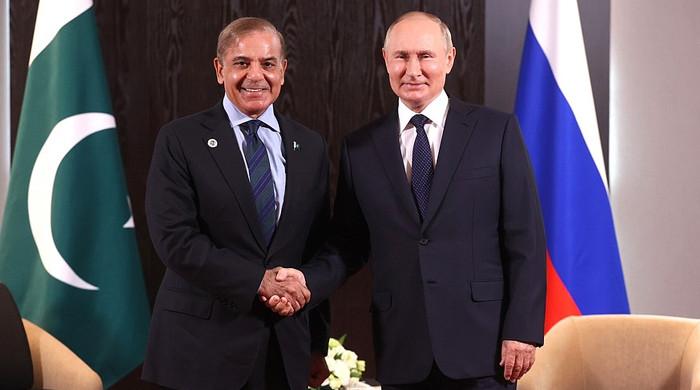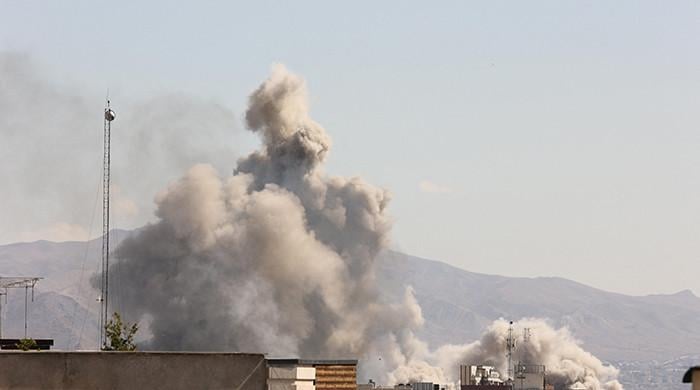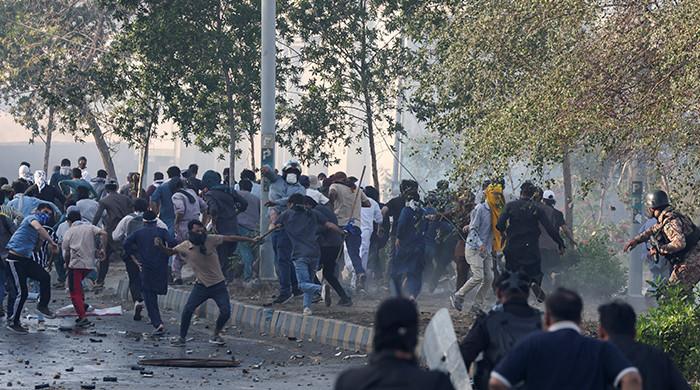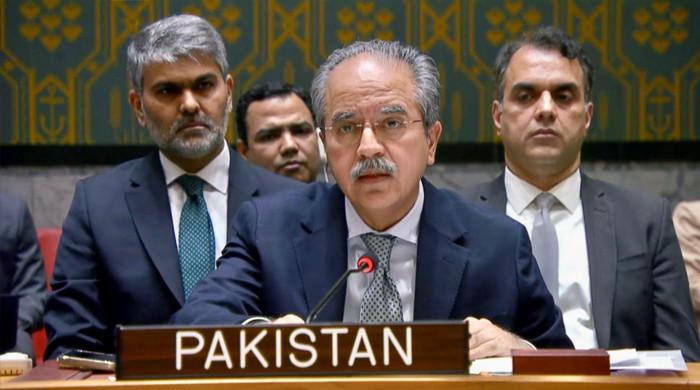Has environment taken a front seat this time in elections?
It took a drastic rise in temperatures for three consecutive years but political leaders are finally taking notice of the issue of climate change in Pakistan
July 24, 2018
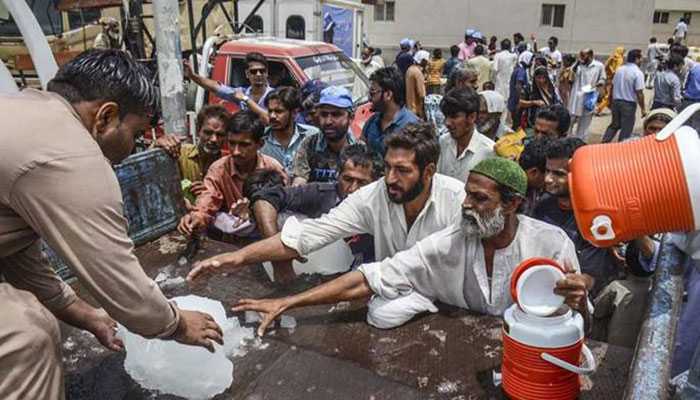
It took a drastic rise in temperatures for three consecutive years for the political leadership of the country to finally take notice of the issue of climate change in Pakistan.
In a season when flowers bloom, one of Pakistan’s southern cities, Nawabshah, braced the hottest temperature in the world in April, according to meteorologists. The city, home to over a million people, recorded a scorching temperature of 50˚C while other cities including Karachi experienced consecutive heatwaves.
The sweltering temperatures, prolonged power outages and scarcity of water demand concrete action in the coming years in order to prevent mass migration, heatwave-related deaths, and severe drought.
The Global Climate Risk Index 2018, published by German Watch, a global German think tank dedicated to environmental issues, has placed developing countries at the highest risk and ranked Pakistan 40th on the list.
In the long-term Climate Risk Index (CRI), for the period 1997-2016, Pakistan ranked 7th on the list of countries most vulnerable to climate change. The report made the assertion based on 141 events, causing annual loss of 523.1 lives and $3.8 billion in economic damages.
During the same period, two South Asian countries Sri Lanka and India were among the most adversely affected.
It is pertinent to mention here that Pakistan has recently been susceptible to sudden and drastic climate change events. In 2015, more than 1,200 people were reported to have died after a brutal heatwave swept Karachi. In the 2010 countrywide floods, more than 2,000 people died and an estimated damage of $43 billion was caused to the economy.
Environmental issues no more on the back burner in 2018 polls
These heatwaves signal to a bigger issue, which includes annual rises in temperature, flash floods, and droughts which can leave the country in dire straits.
In the upcoming elections, the mainstream political parties have shed unprecedented light on environmental and climate change issues, prioritising measures to counter them.
Among the manifestos of the main political parties, Pakistan Muslim League-Nawaz arguably takes the lead for putting forth most concrete and tangible points to tackle climate change. The Pakistan People’s Party has also presented a promising agenda on environmental issues.
But let’s start with the Pakistan Tehreek-e-Insaf. The party intends to present a “cross-sectoral and multi-dimensional Green Growth Agenda”.
“We will establish a Green Growth Task Force under the Prime Minister’s cell,” the PTI’s manifesto reads.
After its much-touted ‘One Billion Tree Tsunami’, the party plans to introduce a ‘10 Billion Tree Tsunami’ which it says will span over five years “under principles of true forest valuation, community stewardship as well as public-private partnerships”.
The Imran Khan-led party also vows to present a yearly national “eco budget”.
PML-N on environment
As the PML-N was in power for five years, it has made a comparison of its past performances and pitched future agenda for and beyond 2018.
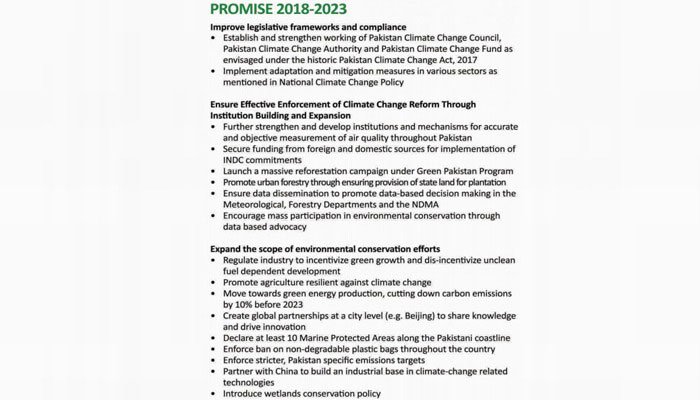
In its manifesto, the party reminds the public that it passed the historic Pakistan Climate Change Act 2017 and ratified the Paris Climate Agreement. It also mentions that it approved Pakistan’s first National Water Policy to control water shortage.
PPP’s environmental vision
PPP is not far behind in conveying its intended policy framework for environmental concerns pestering the country.
Highlighting the importance of pragmatic environmental policies, the party has urged for participation from both private and private sectors for achieving uniformity across all sectors including water, health, agriculture and clean energy.
“The institutional architecture for addressing climate change challenges exists in the form of the National Climate Change Council (NCCC), National Climate Change Authority (NCCA) and the Climate Change Fund (CCF) mandated under the Climate Change Act, 2017; along with the proposed Disaster Risk Management Fund,” it says in its manifesto.
“Climate action, therefore, cannot be seen as a special sector. It is part and parcel of decision-making across policy areas,” the party summarises.
Dissecting the persisting issues into categories, namely; adaptation and mitigation, the document calls the former of utmost importance. Meanwhile, it also discusses standards and incentives being introduced for infrastructure and transport though legislation.
Ban on single-use plastics, promotion of clean energy, and upgradation of weather monitoring systems are also mentioned.
What do experts say?
Speaking on the Climate Change Act, Professor Dr Moazzam Ali Khan for Environment Studies told Geo.tv, “After the 18th amendment the environmental decisions have been delegated to the provincial governments. This will make it harder, because if for example water is concerned, Indus River is distributing water to most of the country, and it originates from one province and goes to the others, so the first province gets to decide its supply before others can even formulate their policy.”
According to Dr Khan, emissions from automobiles and other pollutants cannot be controlled on only a provincial level either. “It has to be a countrywide effort. In fact, now the environmental issues are to be looked at from a regional point of view.”
Dr Hassan Kazmi, who teaches at University of Karachi’s Geology department, shared his opinion on the Climate Change Act. “It’s not that simple. First, the Climate Change Act is not something that can be decided and then the work considered done. It needs to be implemented, and so far it has not been implemented the way it should be.”
Regarding Pakistan’s carbon footprint and the practicality of the politicians’ promises to reduce it, Dr Moazzam said, “There are approximately 700 motorcycles per day on the streets of Karachi alone. Multiply that on other cities and other forms of vehicles and vehicular emissions, and it becomes impossible to keep a lid on the carbon emissions. There are so many other channels that are polluting the air and water and increasing our carbon footprint. It is absolutely impossible to claim that we can reduce our carbon footprint, especially if the policy-making powers are not centralised.”
Speaking on coal power plants becoming the new main source of power and its carbon emissions, Dr Kazmi said, “Coal power plants do add to the carbon emissions, but consider the fact that we do not have many alternative energy sources. So if we can reduce the environmental damage from other channels like vehicular emissions, it will be more effective and a better strategy as well.”
Clean energy policy consultant for Climate Reality India, Rakesh Kamal also spoke to Geo.tv, and on the question of environmental changes in South Asia, he said, “With most of the South Asian countries dependent on glaciers in Himalayas for water, it becomes very important to protect it from climate change. Any impact on the glaciers will directly affect agriculture which is one of the prime sources of livelihood in all these regions.”
He said that in order to counter environmental changes, Pakistan has successfully ratified the Paris Agreement for reducing emissions which is a step in the right direction. He added that Pakistan has also signed the Kigali Agreement to reduce hydrofluorocarbons which are among the main reasons for climate change.
“Stringent agreements should also be made in aviation and shipping emissions which are bound to grow sooner or later,” he said.
Drawing comparisons with Pakistan’s neighbour, he said the way solar targets have been set up in India has helped the Indian solar industry boom. “There is a need to provide better environment for these players. Similarly, promotion of electric vehicles and subsiding and enabling an infrastructure for charging could go a long way.”
— Nida Mujahid Hussain works as an Associate Producer for Geo.tv, she tweets as @NidaMujahid






